Citizens around the world unite around the concept that Trust is Dead.
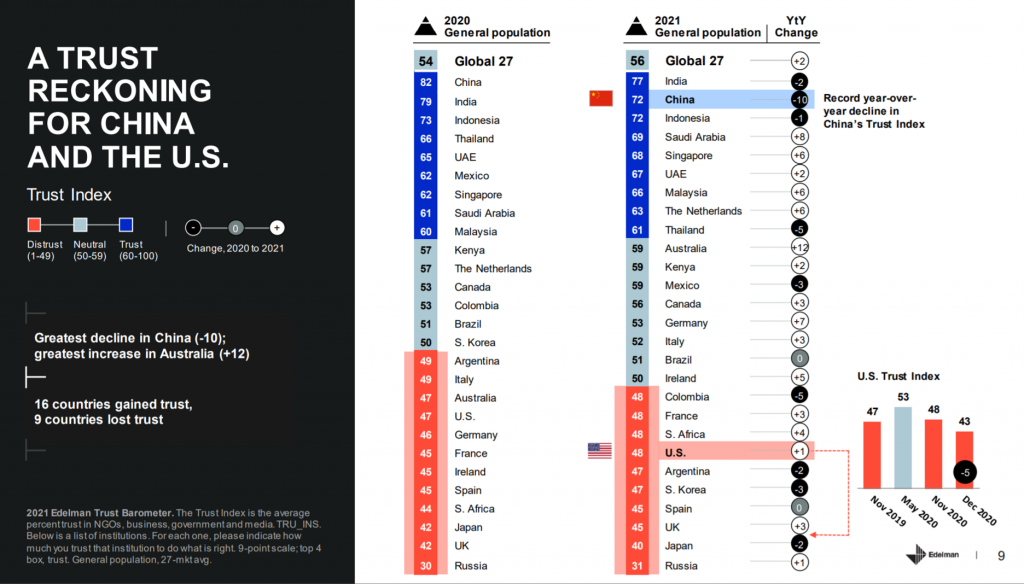
This is no truer than in the U.S., where trust in every type of organization and expert has plummeted in the wake of the COVID-19 pandemic, political and social strife, and an economic downturn.
Welcome to the sobering 2021 Edelman Trust Barometer, released this week as the world’s technology innovators and analysts are convening at CES 2021, and the annual JP Morgan Healthcare meetup virtually convened.
As the World Economic Forum succinctly put the situation, “2020 was the year of two equally destructive viruses: the pandemic and the infodemic.”
The trust reckoning in so much of the world has to do with the latter, what Edelman coins as “information bankruptcy.”
This year, the firm has quantified the concept of citizens’ “information hygiene” across four metrics: news engagement, avoiding information echo chambers, verifying information, and not amplifying unvetted information.
Based on this index, only one in four people around the world have “good” information hygiene. For example, 57% of consumers share or forward news items they find interesting, but only 29% of these folks have good information hygiene (specifically, vetting the source and veracity of the shared story).
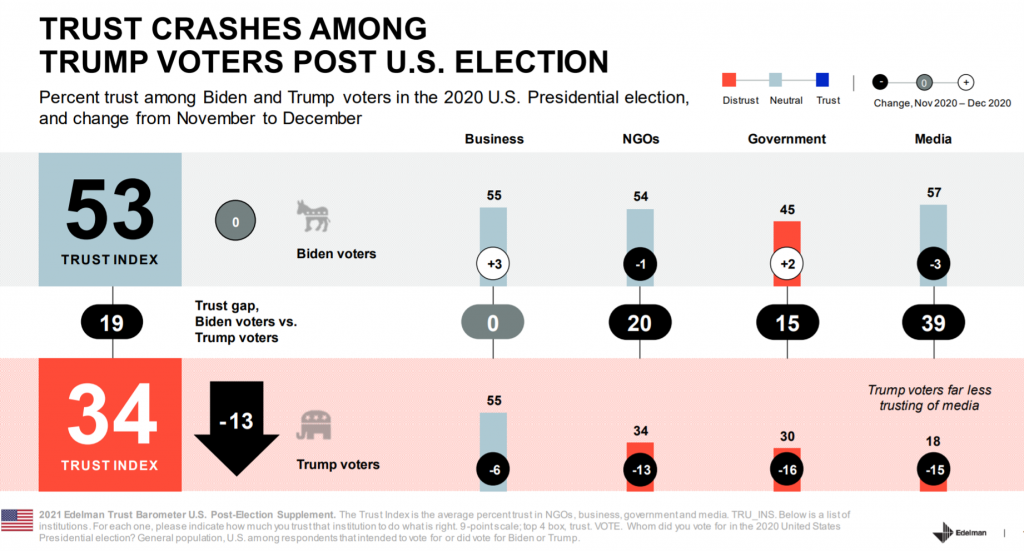 Do mine the full global study linked above, as I segue into some of the U.S. specific findings here.
Do mine the full global study linked above, as I segue into some of the U.S. specific findings here.
In America, trust truly crashed by December 2020, falling to a low Richard Edelman said he had never seen in the 21 years conducting this study.
This chart illustrates that while trust precipitously fell in the U.S. overall, trust especially dramatically dropped among Trump voters.
Trust was higher overall for Biden voters for business, NGOs, government and media, with trust gaps versus Trump voters for media (a 39 point gap), NGOs (20 point gap), and government (15 point gap).
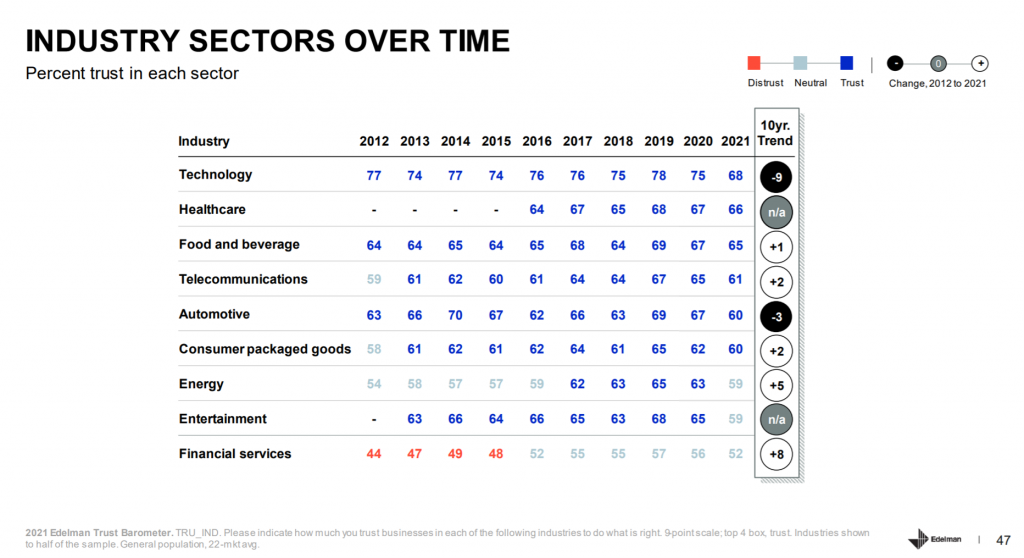 That trust gap translates differently across industry sectors, which I’ve tracked on the Edelman Trust Barometer for many years.
That trust gap translates differently across industry sectors, which I’ve tracked on the Edelman Trust Barometer for many years.
Last year in January 2020, Edelman found consumers’ trust in healthcare was fairly flat at 67, barely changing in this year’s study. Note that the technology sector still ranks tops versus other industries, albeit dropped by a large 9 points now ranking very close to healthcare trust. What gained in the pandemic year for trust were food and beverage and telecomms, in third and fourth places, which remind us the importance of those two basic necessities for our basic needs in the COVID-19 public health crisis and staying home to stay safe and healthy.
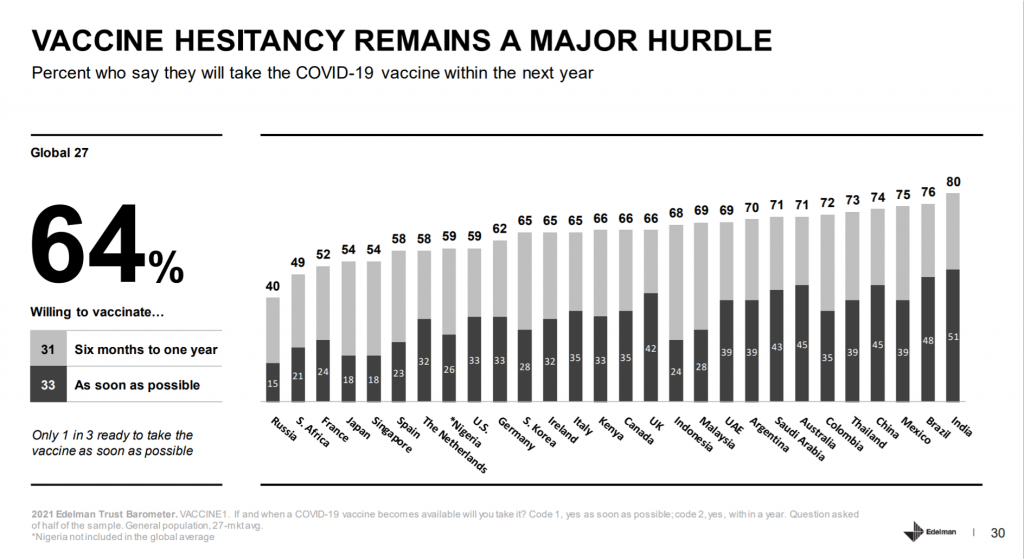 The pandemic year and lifestyle found global health citizens focus on, well, health, hygiene, and safety. In the midst of this, folks sought information to help them manage daily life, and the infodemic — with people consuming information from sources in their political-social-cultural bubbles supplying them fodder for their views on COVID-19.
The pandemic year and lifestyle found global health citizens focus on, well, health, hygiene, and safety. In the midst of this, folks sought information to help them manage daily life, and the infodemic — with people consuming information from sources in their political-social-cultural bubbles supplying them fodder for their views on COVID-19.
This chart on vaccine hesitancy illustrates that the U.S. ranks fairly high on hesitancy — that is, fewer U.S. health citizens would be willing to take the coronavirus vaccine in the next year than people in most other countries, with the keenest vaccine-seekers in India (ranking highest at 80%) along with Brazil, Mexico, China, Thailand, Colombia, Australia, and Saudi Arabia.
On the low end of vaccine-enthusiasm were Russia, lowest at 40%, followed by South Africa (49%), France (52%), Japan and Singapore (54%), Spain and the Netherlands (58%).
The U.S. follows them at 59% wishing to get the vaccine within the next year.
 Edelman then connects the dots between information hygiene and vaccine hesitancy in this chart. It’s clear that health citizens with lower information hygiene have lower willingness to get a COVID-19 vaccination in the next year compared with consumers embodying higher information hygiene, vetting data sources and engaging with news.
Edelman then connects the dots between information hygiene and vaccine hesitancy in this chart. It’s clear that health citizens with lower information hygiene have lower willingness to get a COVID-19 vaccination in the next year compared with consumers embodying higher information hygiene, vetting data sources and engaging with news.
The info hygiene-vaccine gap in the U.S. is 17 points between those who would get the vaccine (indexing higher for information hygiene) versus those avoiding the vaccine (with poor info hygiene).
This will threaten the U.S. recovery from the coronavirus pandemic, Edelman asserts.
 Health Populi’s Hot Points: This year’s Edelman Trust Barometer came to me yesterday on 13th January, about the time I was listening to Microsoft President Brad Smith’s keynote at CES.
Health Populi’s Hot Points: This year’s Edelman Trust Barometer came to me yesterday on 13th January, about the time I was listening to Microsoft President Brad Smith’s keynote at CES.
Smith wove a crucial, impactful plotline from first visiting the inside of a highly-secure Microsoft server plant, a “glimpse inside our cloud in Quincy, Washington,” Smith kicked off the tour.
The view may be generic but it represents the most important infrastructure of the 21st century, Smith explained. The complex houses the computers that fuel our lives, 20 buildings each large enough to house two commercial aircraft sitting on 300 acres, Smith described.
“Almost no one ever gets to see this,” Smith said, putting on his mask as “we” entered the massive facility, shown here in a picture from his talk (Smith is on the right).

The facility stores as much data as in 50,000 Libraries of Congress, he described.
Smith then segued his story to a popcorn movie night at Camp David with President Ronald and First Lady Nancy Reagan watching the movie War Games, to the recent SolarWinds hack….weaving in John F. Kennedy’s speech at Rice University in 1962 speaking boldly about going where no one had gone before — to the Moon.
[A sidebar on the Reagan’s movie night is in order here – marrying pop culture to real life. The Reagan’s watched War Games on Saturday night June 4, 1983.
After the movie, Nancy asked her beloved Ronnie, “Could something like this really happen?” The President then asked this of his defense experts, to which General John Vessey, Chairman of the Joint Chiefs, responded: “Mr. President, the problem is much worse than you think.”]
But it wasn’t just JFK’s moonshot remarks that were inspiring. Smith also reminded us another key line from that speech which was so prescient — and especially important to be spoken out loud in the context of CES 2021:
“Technology has no conscience.”
This is physical embodiment of our mission, Smith said, “to empower every person on planet to achieve more.”
But there’s a darker side, he continued, with new perils arising like the SolarWinds breach. This spans privacy and cybersecurity, digital safety and the loss of control that people, communities, and countries face.
The first image of a hacker was a teenager sitting on a bed, Smith reminded us, like Matthew Broderick’s character in War Games drawn in to playing the game. Then the threat of global nuclear war.
“Science is catching up to science fiction,” Smith warned, with insights for governments and consumers alike.
He asked two strategically important questions:
- What are the rules of the road to guide us on the planet?
- What does this mean for what we in industry need to do?
As CES 2021 comes to a close this week, we must come together with a collective voice to agree that supply chains, communications disruptions, and hacking of our personal medical data must not, will not, be tolerated.
We must collaborate together, share data such that we change culture to make sharing a win-win – along the way, protecting personal privacy, vigilantly.
 We must ensure that humanity retains control of the computers and connected things we create and use.
We must ensure that humanity retains control of the computers and connected things we create and use.
Smith concluded with reasons to be optimistic, represented by the sunny road he’s standing with here.
He reminded us that, when humanity finally first orbited the moon in December 1968, it was a terrible time, a difficult year when we witnessed violence in the streets and the assassination of two of America’s great leaders: Martin Luther King, Jr., and Robert F. Kennedy.
But then, we got to the moon….and what did we learn?
It was not about the rocks that were picked up….it was looking back from the moon’s surface to Planet Earth….a common bond for everyone.
“Technology has no conscience.”
But we do. For all of us in tech, and especially in the health/care ecosystem, this is our opportunity to embrace this multi-pronged pandemic-era challenge for all health citizens and ensure that the technology and innovations we develop serve each other and the world.
Thanks to both the Edelman organization and Microsoft President Smith for inspiring me after this intense week at CES 2021, JP Morgan, the W2O Group’s digital health summit, and other interstitial meetings that have blown my mind over the past four days and disrupted my sleep.
My goal here is to do my part to improve information hygiene for my brothers and sisters in the health/care ecosystem. Thanks for your patience with this long post, longer than usual….


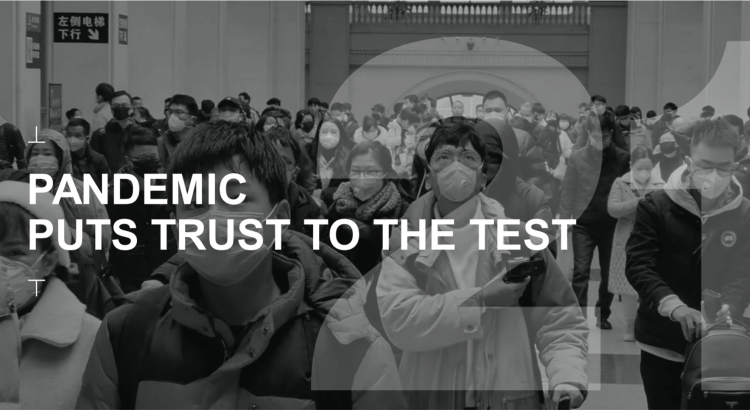


 I love sharing perspectives on what's shaping the future of health care, and appreciate the opportunity to be collaborating once again with Duke Corporate Education and a global client on 6th May. We'll be addressing some key pillars to consider in scenario planning such as growing consumerism in health care, technology (from AI to telehealth), climate change, and trust -- the key enabler for health engagement or dis-engagement and mis-information. I'm grateful to be affiliated with the corporate education provider
I love sharing perspectives on what's shaping the future of health care, and appreciate the opportunity to be collaborating once again with Duke Corporate Education and a global client on 6th May. We'll be addressing some key pillars to consider in scenario planning such as growing consumerism in health care, technology (from AI to telehealth), climate change, and trust -- the key enabler for health engagement or dis-engagement and mis-information. I'm grateful to be affiliated with the corporate education provider  Thank you FeedSpot for
Thank you FeedSpot for